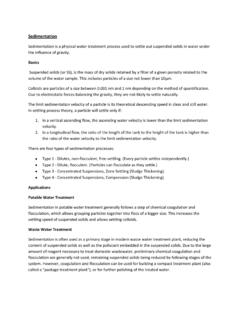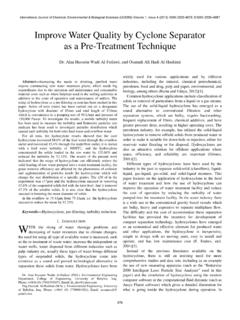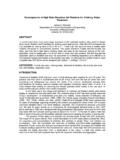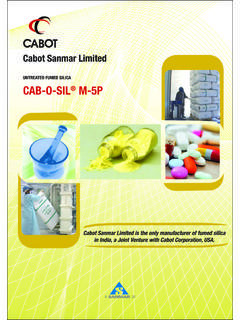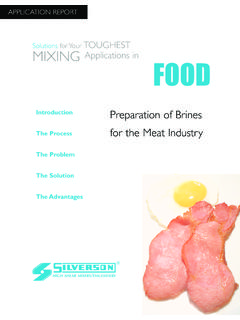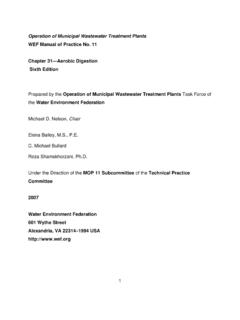Transcription of Water Pollution Control Challenges in Myanmar - DWIR
1 Water Pollution Control Challenges in Myanmar Soe Myint [ (Mining), , (AIT), DBL) OSH Professional] Joint General Secretary, Myanmar Engineering Society Brief Myanmar is encouraging Investments for Industrial and other sectors by inviting Domestic & International Investors. Considerable Challenges on Environment due to increasing investments. Water is essential to life on our planet. It is a must for ensuring uncontaminated stream, rivers, and lakes as a prerequisite of sustainable development. Water Pollution is one of the concerns for Development as well as Environmental Conservation & Management. Types of Water Pollution Heavy Metals from Industrial Process can accumulate in nearby lakes and rivers. Industrial Waste often contains many toxic compounds that damage the health of aquatic animals and those who eat them. Microbial pollutants from sewage often results in infectious diseases that infect aquatic life and terrestrial life thorough drinking Water . Organic matter and nutrients causes an increase in aerobic algae and depletes oxygen from the Water column.
2 Sulfate particles from acid rain change the pH of Water making it more acidic, this damages the health of marine life in the rivers and lakes it contaminates , and often increase the number of mortalities within an environment Suspended particles can often reduce the amount of sunlight penetrating the Water , disrupting the growth of photosynthetic plants & micro-organisms. Effects of Water Pollution Water Pollution is very harmful to humans, animals and Water life. Effects can be Catastropic, depending on the kind of chemicals, concentrations of the pollutants, and where there are polluted. Death of aquatic animals Disruption of food-chains Diseases Destruction of ecosystems Source: copper mine Pollution Major Water Pollution Sources Major Water Pollution sources in Myanmar can be identified as : Industrial Waster Water & Urban Waste Agriculture Mining Pollution by Industrial Waste Water Pollution by Industrial Waste Water (Cont.) Pollution by Agriculture Consumption of Pesticides have gradually increased year after year Biggest issue is residue in crops & in paddies Residues in these paddies and crop fields can damage the soil as well as pollute the Water by releasing to the neighboring rivers.
3 Pollution can be reduced By Controlling the use of some toxic pesticides and encourage the utilization of conventional bio fertilizers as a substitute for chemical fertilizers Pollution by Mining Mining effects fresh Water thorough heavy use of Water in processing ore, and thorough Water Pollution from discharged mine effluent and seepage from tailings and waste Rock impoundments. While there have been improvements to mining practices in recent years, significant environmental risks still remain. Types of Water Pollution from Mining Acid Mine Drainage Heavy Metal Contamination & Leaching Processing Chemical Pollution Erosion and Sedimentation Acid Mine Drainage , AMD Acid Mine Drainage is a natural process whereby Sulphuric Acid is produced when Sulphides in rocks are exposed to air and Water . When large quantities of rock containing sulphide minerals are excavated from an open pit or opened up in an underground mine, it reacts with Water and oxygen to create sulphuric acid.
4 Acid will leach from the rock as long as its source rock is expose to air and Water and until the sulphides are leached out- the process that can last several years. Acidic tailings containment ponds may also leach into surrounding land. Acid is carried off the minesite by rainwater or surface drainage and deposited into nearby streams, rivers, lakes and ground Water . It is a potentially severe Pollution hazard. AMD severely degrades Water quality , and can kill aquatic life and make Water virtually unusable. AMD is a watershed issue of importance to the full range of public stakeholders. To begin to address the very real problems posed by AMD, the concerned authority must : Prevent future loss of aquatic habitat to AMD Inventory and cleanup existing acid generating mine sites Improve public access to information on monitoring and enforcement of AMD treatment and reclamation and Prevent future AMD by improving environmental risk assessment and adopting a liability prevention approach to future AMD mine assessments.
5 Acid Mine Drainage >> Prevention is the key. Acid Mine Drainage Heavy Metal Contamination & Leaching Heavy metal Pollution is caused when such metals as arsenic, cobolt, copper, cadmium, lead, silver and zinc contained in excavated rock or exposed in an underground mine come in contact with Water . Metals are leached out and carried downstream as Water washes over the rock surface. Although metals can become mobile in neutral pH conditions, leaching is particularly accelerated in the low pH conditions such as are created by Acid Mine Drainage. Processing Chemical Pollution This kind of Pollution occurs when chemical agents (such as cyanide, mercury or sulphuric acid used by mining companies to separate the target mineral from the ore). Chemicals spill, leak, or leach from the mine site into nearby Water bodies. These Chemicals can be highly toxic to humans and wildlife. Erosion and Sedimentation Mineral development disturbs soil and rock in the course of construction and maintaining roads, openpits, and waste impoundments.
6 In the absence of adequate prevention and Control strategies, erosion of the exposed earth may carry substantial amounts of sediment into streams, rivers, and lakes. Excessive sediment can clog riverbeds and smother watershed vegetation, wildlife habitat and aquatic organisms. Mine Operation Sites & Pollution Photos Passive Waste Water Treatment (Flow Chart) Waste Water from Mine Drain ( Constructed with Limestone) Oxidation (Stair Shape, Water Fall) Detention /Settling Pond Filters (With Sand, Crushed Lime Stone, Coal) Drain out and flowing thru Wet Lands ( with Plants) Water Good enough to flow to the streams Source: Htun Linn San Passive Water Treatment (Pros & Cons) Pros Low Investment cost Low operating cost Low requirement of Processing equipment No use of harmful substances Cons Frequent needs of measuring the waste Water quality Low possibility of changing the quality of waste Water Need More Space of Land Policies and Guidelines for Ensuring Sustainable Environment National Environmental Policy (1994) Myanmar Agenda 21 (1997) National Sustainable Development Strategy (2009) Environmental Conservation Law (2012) Environmental Conservation Rules (2014) Environmental Impact Assessment Procedure (2015) National Environmental Quality (Emission) Guidelines) (2015) Mining Law (1994) Actions Require Good Governance plays an important role in Water Management, for this Participation of stakeholders Concerned Authorities, Companies, Public & CSOs Collaboration between ministries.
7 Enforcement on following guidelines / EMPs and Monitoring on Physical operations Providing Necessary Test Equipment and Laboratories Capacity building at both government & private sectors Thank You for your kind attention
